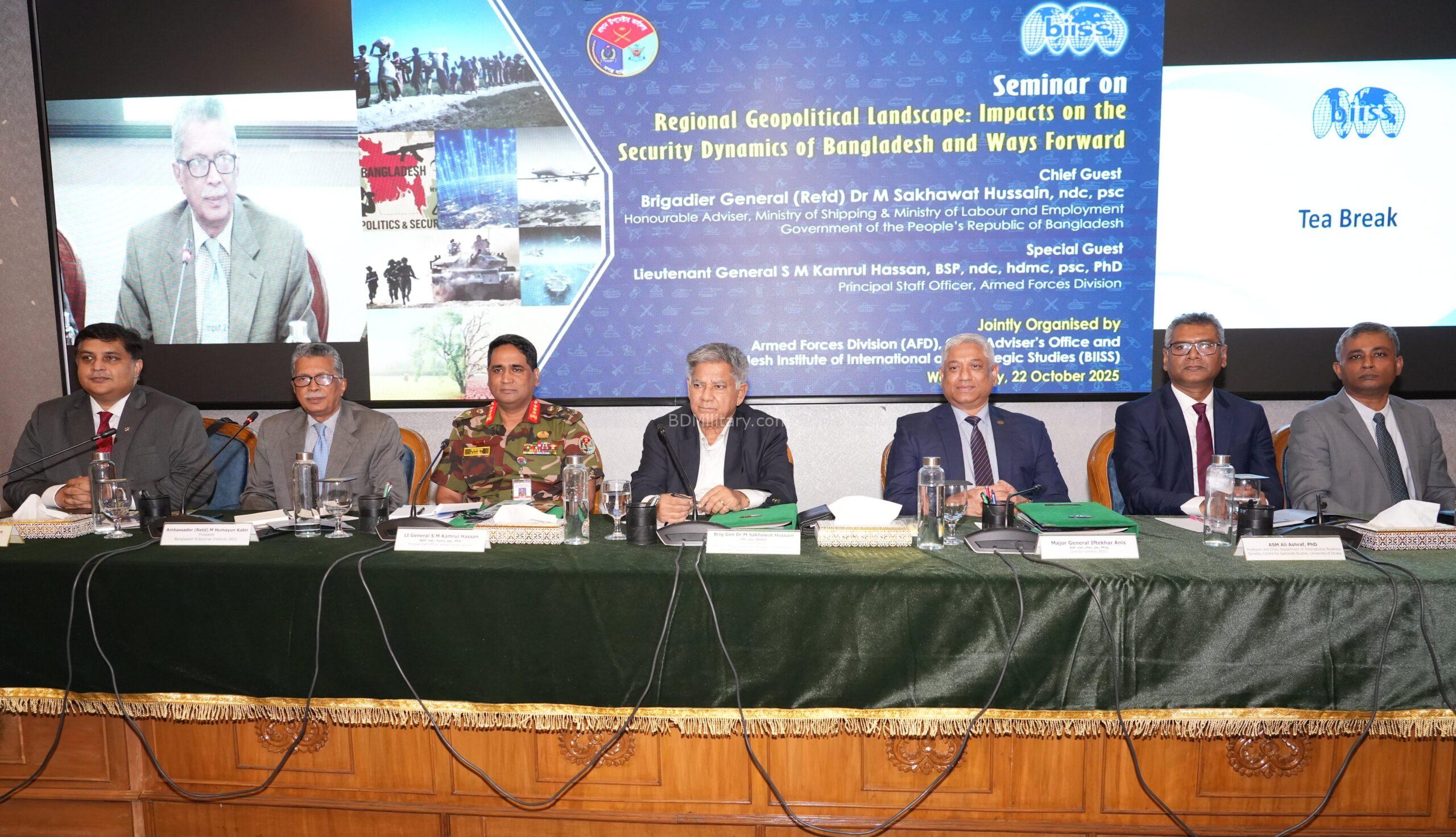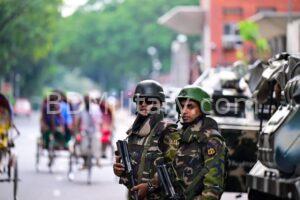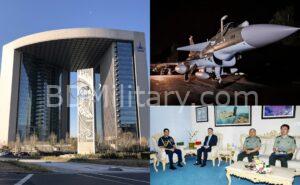Top military official calls Myanmar the greatest security challenge since independence as Dhaka signals a tougher border stance
Bangladesh’s top defence official has described the situation along the Myanmar border as the most serious security challenge since the country’s independence, signalling a firm warning toward the Arakan Army (AA) insurgent group amid rising cross-border tensions.
Lieutenant General S M Kamrul Hassan, BSP, ndc, hdmc, psc, PhD, the Principal Staff Officer (PSO) of the Armed Forces Division (AFD), made the remarks while speaking as the special guest at a high-level seminar titled “Regional Geopolitical Landscape: Impacts on the Security Dynamics of Bangladesh and Ways Forward”, jointly organised by the Armed Forces Division and the Bangladesh Institute of International and Strategic Studies (BIISS).
The seminar, held at the BIISS Auditorium in Dhaka, brought together senior government officials, foreign diplomats, ambassadors, military officers, academics, and media representatives to assess the shifting geopolitical trends and their implications for Bangladesh’s national security.
Lt Gen Hassan’s Warning on Myanmar
Addressing the gathering, Lt Gen Hassan said that Myanmar’s internal conflict has increasingly affected Bangladesh’s border regions, particularly through the activities of the Arakan Army, whose cross-border incursions and abductions have strained relations and endangered Bangladeshi civilians.
“Among the three key actors in Myanmar — the military junta, the Arakan Army, and the Rohingya community — it is the Arakan Army that harbours the deepest hostility towards the Rohingyas,” Lt Gen Hassan said, warning that the group’s operations now pose a direct threat to Bangladesh’s security and stability.
He stressed that Bangladesh must strengthen its defence capabilities to adapt to the evolving security environment and hinted that in future, the nation might consider joining strategic or defence blocs that align best with its national interests.
“We must build the capacity to safeguard our sovereignty in a rapidly changing geopolitical environment,” he added, noting that the Armed Forces Division will continue to play a pivotal role in ensuring national preparedness.
Lt Gen Hassan also shed light on the growing complexity of the regional and global geopolitical context, saying that modern security challenges are increasingly defined by political alignment, technological competition, and economic interdependence rather than geography alone.
He highlighted the need for clarity in national security strategy, foresight in policymaking, and the development of Bangladesh’s defence industry to ensure long-term resilience.
Seminar Highlights
The seminar was inaugurated with welcome remarks by Major General Iftekhar Anis, BSP, awc, afwc, psc, pEng, Director General of BIISS, who underscored the importance of strategic dialogue in shaping Bangladesh’s policy direction amid global uncertainty.
The event’s Chief Guest, Brigadier General (Retd) Dr M Sakhawat Hossain, ndc, psc, Adviser to the Ministry of Shipping and the Ministry of Labour and Employment, discussed Bangladesh’s geopolitical challenges, social development priorities, and the Rohingya crisis.
“No country can survive alone in the current global context — national security cannot be ensured without regional stability and mutual cooperation,” he said, calling for a balanced and pragmatic approach to international engagement.
The main paper of the seminar was presented by Professor Dr A. S. M. Ali Ashraf, Chairman of the Department of International Relations at the University of Dhaka, with additional panel discussions led by Professor Dr Niloy Ranjan Biswas of Dhaka University and Professor Dr Sahab Enam Khan of Jahangirnagar University.
A lively open discussion and summary session were conducted by M Humayun Kabir, former ambassador and President of the Bangladesh Enterprise Institute (BEI), who also moderated the seminar. Captain Shafiul Muznibin (Taz), psc, BN, performed the role of seminar conductor on behalf of the Armed Forces Division.
Speakers collectively analysed Bangladesh’s position, challenges, and opportunities in the changing South Asian and Indo-Pacific security environment, highlighting the need for regional cooperation, defence efficiency, and integrated strategies to tackle emerging non-traditional threats.
The event concluded with a consensus that the seminar would play a supportive role in advancing Bangladesh’s national interests, enhancing strategic vision in policymaking, and promoting a realistic and adaptive national security strategy in line with global transformations.
Background: Lt Gen S M Kamrul Hassan
Lieutenant General S M Kamrul Hassan was appointed the 17th Principal Staff Officer of the Armed Forces Division on 22 August 2024, bringing decades of expertise in training, doctrine development, and combat operations.
He has served as Commandant of the Bangladesh Military Academy (BMA), Chief Instructor at the Defence Services Command and Staff College (DSCSC), and Senior Directing Staff at the National Defence College (NDC).
In operational commands, he led two infantry battalions, including one under United Nations peacekeeping deployment, and later commanded two infantry brigades in Lebukhali and Sylhet, as well as the 66th Infantry Division.
Lt Gen Hassan has over ten years of combat and counter-insurgency experience in the Chittagong Hill Tracts and has participated in UN peacekeeping missions in Iraq-Kuwait, Liberia, and the Central African Republic, where he commanded Bangladeshi troops as a Brigadier General.
His emphasis on strategic foresight and defence capability development reflects an evolving doctrine within the Armed Forces Division — one that aims to position Bangladesh as a confident and capable actor in an increasingly complex regional landscape.
Analysts believe that the seminar’s discussions, coupled with Lt Gen Hassan’s remarks, reflect a strategic recalibration in Dhaka’s security outlook — signalling that Bangladesh may adopt a more assertive posture as instability along the Myanmar border continues to threaten national stability.


